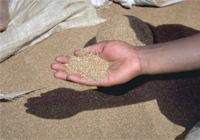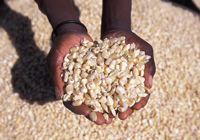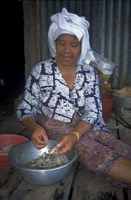Leaders of the Group of Twenty (G-20) countries are gathering in London for a summit to identify steps that can help restore global economic growth.
The current crisis in financial markets and the world economy strains both governments’ global development commitments and national resources. Households already most vulnerable to poverty, risk further impoverishment.
This is the first in a series of articles on how poverty impacts people already affected by HIV and how investment in sustainable financing is critical for AIDS and development responses around the world. Access to affordable food is vital for workers living with HIV, explains Robin Landis, HIV Policy Officer with the World Food Programme.
HIV and high food prices
This article appears in the current edition of AGENDA magazine, published by the International Transport Workers’ Federation.
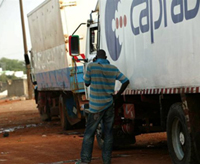
A truck driver in Mali. Credit: UNAIDS/P. Virot
Although antiretroviral drugs (ARVs) are free in Mozambique and access to them is relatively easy, Ana Costa abandoned her treatment some months ago after two years of suffering from nausea and weakness as a result of taking the powerful drugs on an empty stomach. Ana is not alone in facing a gut-wrenching dilemma – her health is so fragile that she is unable to work yet if she does not work she cannot afford to buy food. Although she knows that her health depends on the ARVs, she feels that she has no choice but to abandon the treatment since she cannot eat regularly.
It may not be the first thing one thinks of when the topic of HIV comes up, but food and more precisely, good nutritious food, is often the most pressing need for people living with HIV and their families. Malnutrition and HIV are a deadly combination: HIV attacks the immune system and deteriorates the nutritional status one needs to fend off infections while poor nutritional status hastens the onset of AIDS-related illnesses.
Hunger plays a commanding role in spreading the virus, as it drives people to desperate measures that put their lives and others at risk just to put food on the table.
Hunger plays a commanding role in spreading the virus, as it drives people to desperate measures that put their lives and others at risk just to put food on the table. In parts of southern Africa it is not uncommon for women to be forced into exchanging sex for a meal, a ride to the clinic or school fees for their children. The immediate need to make ends meet can cloud the decisions that impact their long-term future.
The importance of good nutrition for healthy living is well established and it is equally well known that mobile transport workers have less than optimum nutrition due to the demands of the job. It is common for transporters to eat irregular meals of poor nutritional quality for extended periods while they are working. Poor nutrition has a direct impact on the body’s ability to fight off infection and remain strong and productive on the job.
High food prices make a bad situation worse
The impact of climate change and the loss of agricultural land due to biofuel production have both contributed to inflated food and oil prices, which in turn have seriously impacted food production and distribution costs. The current crisis is affecting people around the world, especially those living in developing countries – people in rural areas who depend on agriculture for their livelihood and urban dwellers who must purchase everything they eat.
The sharp rise in global food prices, especially since early 2008, has already resulted in dietary changes that severely affect the health and nutritional status of millions of people. To cope with this crisis many families will avoid more expensive foods that also happen to be the most nutritious (meat, poultry, eggs and fish, fruit and vegetables) and reduce the size and frequency of meals.
Such dramatic changes in food consumption can have dire nutritional and health consequences for the most vulnerable in society: young children, pregnant and lactating women and the chronically ill, especially those with TB, HIV and AIDS. For poor, HIV-affected households the shift to less nutritional foods may happen sooner as a result of the increased burden of care. When the quality of food goes down so does the presence of micronutrients, which in turn can trigger illness and infections, making the already sick even sicker. It can also lead to drug resistance, treatment failure and even new strains of virus as HIV-positive people begin to skip doses or abandon treatment altogether because they have no food to accompany their medication.
The same goes for people on TB treatment. They are at increased risk of dropping out of treatment programmes as they divert money that would be spent on transportation or other needs in favour of buying food. Interrupted TB treatment can result in the proliferation of multi-drug resistant and extremely drug resistant strains of TB – both of which jeopardise the wider public health.
What does this mean for transport workers?
Mobility is a driver of the HIV epidemic. But there are other lesser-known links between the transport sector, HIV incidence and high food prices. In southern Africa, where HIV prevalence is the highest, AIDS has affected transport companies to the point that, even before we see the full impact of this current crisis, there are not enough truck drivers to meet demand. For instance, during the food crisis of 2003-05, the World Food Programme (WFP) contracted over 30 per cent of the total transport business in the region and found it difficult to hire enough vehicles and drivers to deliver food assistance quickly and efficiently. Approximately 80 per cent of WFP’s transport needs are hired locally. The shortage of skilled drivers results in higher transport costs and subsequent higher prices for food and other goods.
WFP is proud to be a core partner, along with TNT, ITF and UNAIDS, of the North Star Foundation, a public-private partnership to improve the health and wellbeing of mobile transport workers and reduce the number of new HIV infections by establishing networks of roadside ‘wellness centres’.
Food aid for HIV
WFP estimates that 22 of the 30 countries in greatest need of food assistance are in sub-Saharan Africa, home to two thirds of the 33 million people living with HIV. In the past, only the poorest 10 per cent of the population has generally needed assistance, but as prices increase more households will slide into poverty and be forced to find ways to cope. Women, who already represent 70 per cent of the world’s poor, will suffer the most as more will be pushed into transactional sex to survive, which increases the risk of new infections.
Providing HIV positive people with a way out of poverty can help ensure that they have nutritious food on the table, an education for their children and access to medical care and treatment. With food prices projected to stay high, incorporating a nutritious food package into HIV treatment programmes can maximise the benefits of the medicine and guard against treatment failure. For as little as US$0.70 an adult living with HIV can receive a nutritious ration of corn-soya blend, maize meal and beans. In addition to food aid, programmes that link households to livelihood support programmes are needed. If markets are able to provide a nutritious diet, cash transfers or micro-financing may be more appropriate than food packages.
What can workers’ unions do?
- Advocate national policies that prioritise HIV and TB treatment programmes and incorporate nutritional packages as part of these programmes.
- Use national and regional meetings to inform and educate union members on issues of food and nutrition insecurity in the context of HIV and AIDS.
- Be the eyes and ears of the community: let the ministries of health and national AIDS committees know when communities are struggling with the decision to either spend on health care or buy food.
- Support workplace HIV programmes and make sure that they address the importance of good nutrition for people living with HIV. Work with the programme manager to offer advice and assistance to HIV-positive employees who may be having difficulty keeping a healthy diet.
- Use union networks to help distribute agricultural inputs like fertilizer, seeds and tools and help link communities to markets.
- Lobby employers to ensure that nutrition information and access to nutritious food is available for mobile transport workers while on the job.
Robin Landis is a Policy Officer in the Policy, Planning and Strategy Division of the WFP in Rome. She is also on the Management Team of the North Star Foundation, a public-private partnership to reduce the impact of HIV in the transport sector.




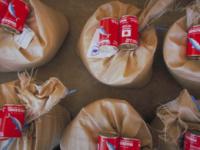


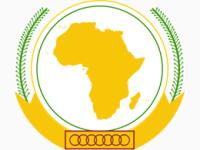
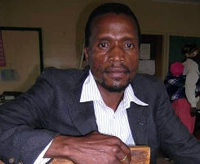

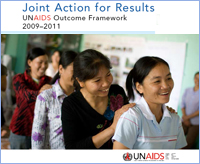


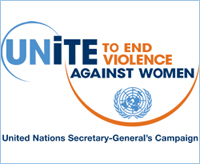
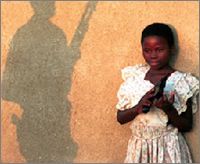 "Women and men: United to end violence against women" is the theme of this year’s International Women's Day which is observed at the United Nations on 5 March 2009 and celebrated internationally on 8 March. Credit: UNAIDS
"Women and men: United to end violence against women" is the theme of this year’s International Women's Day which is observed at the United Nations on 5 March 2009 and celebrated internationally on 8 March. Credit: UNAIDS